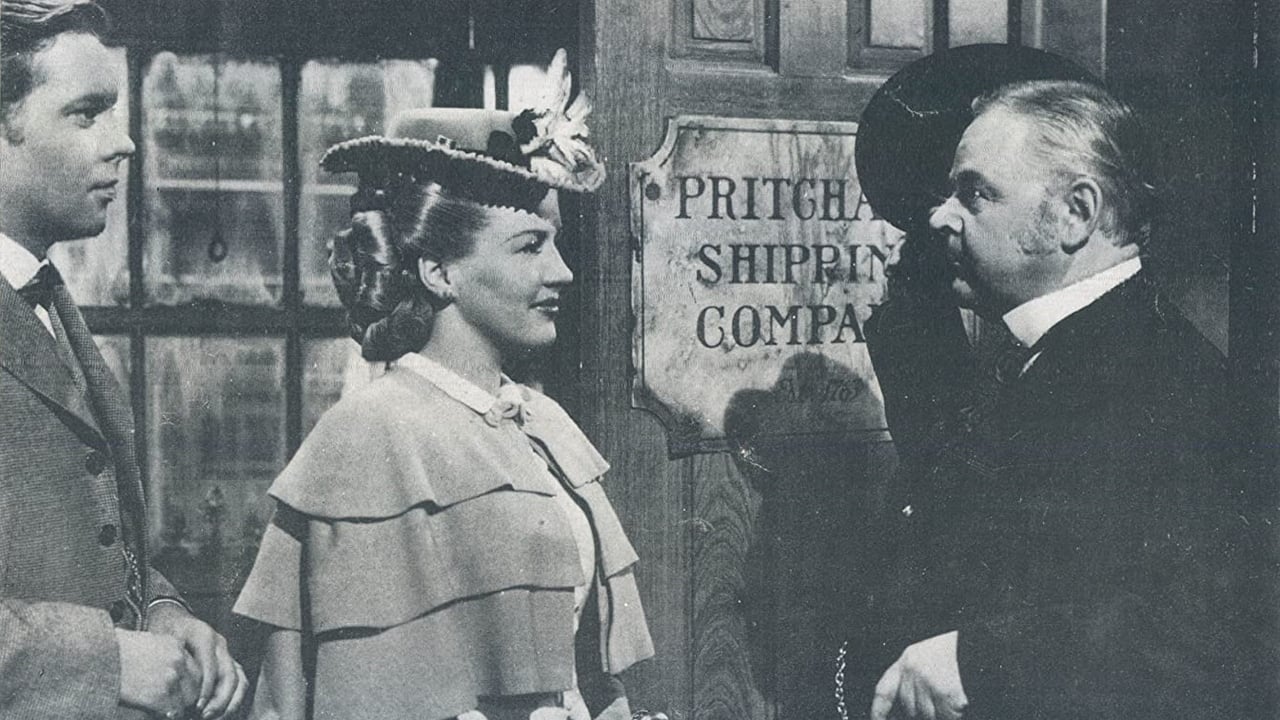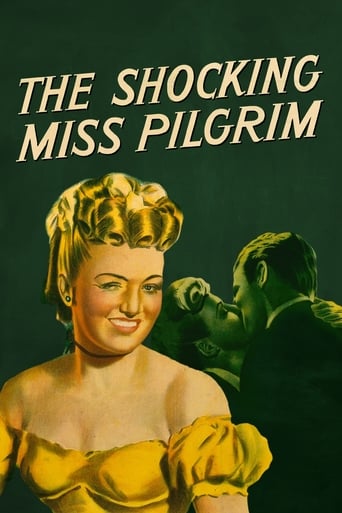

Women dressed like men in the suffrage meeting. Women band members. Haymes' aunt beautifully dressed, but tough and strong personality mesmerized others. Betty dressed very femininely, and even showed the ankle part of her beautiful legs when Haymes was nearby glaring wolfishly.Pilgrim, Peabody, Quincy. Boston New England names. Too much hatred of Boston, though. It would lose the Boston audience. Too insulting. There was no movie code against that kind of "ism".Haymes was a beautiful singer. I also enjoyed him in the movie State Fair.Type Writer became typist. Today, people type on smart phones and tablets. We no longer roll the paper into the platen. Today, also, women aspire to bachelor's degrees and higher, and not just office jobs. In the time portrayed in this movie, Betty's new profession was an uncomfortable situation and threatening to a lot of sexist men.Betty was actually valedictorian over a bunch of men, who comprised most of the graduating class.Miss is now Ms. Betty is still famous, and most people I would think never heard of Haymes.I was looking for the movie about the woman Type Writer, thinking it starred Ginger Rogers, but I think that that movie was called The First Traveling Saleswoman, about a woman who sold corsets also in the same Gilded-Age time period of this movie The Shocking Miss Pilgrim.1874 time period of this movie. American women got the right to vote in 1920. That was 46 years later. 1848 the American women's movement began with Elizabeth Cady Stanton and Lucretia Mott. That was a long, long way, Baby, to 1920. Women, go out to vote next week. Don't stay home. Every time you stay home away from the voting booth, there is still some man out there who is happy you kept your intelligent voice out of the political arena.This was a post World War Two movie, where many women had been Rosie the Riveter. The work world was no longer a stranger. It must have been amusing for women to see Betty conquering the all-male enclave, back in 1874.I did like the singing of Betty, in this movie, plus Haymes also.
... View MoreThis is a first class musical. Several of the songs have become standards and continue to turn up in Gershwin orchestral compilations and in the repertoires of top cabaret artists. Ira Gershwin's lyrics for this show were among his wittiest ever.Betty Grable and Dick Haymes are in great voice. separately and in duet.The scenes in the boarding house peopled by eccentrics were highly original and very funny.It is inconceivable that this film has not been released on VHS or DVD, and that there is no CD of the soundtrack.It is my hope that some connoisseur of show tunes in the music business, like Michael Feinstein, will press for its release in some form.
... View MoreBecause of the prominence of the abolition movement in the 1830s -1860s, other American social movements of the day are not thought of very much. If you are interested, read Tyler's book FREEDOM'S FERMENT, which discusses the international peace movement, woman's rights, and other movements of equal interest in that period - only these did not lead to Civil War. The woman's suffrage movement had begun in 1848 in upstate New York, but it really does not get the momentum that made it memorable until the 1870s. Then Susan B. Anthony goes on trial (also in New York State) for daring to try to vote in a national election. Also Victoria Woodhull throws her hat into the ring (unofficially) for the Presidency in 1872. Later Anthony and Elizabeth Cady Stanton organize the woman's movement, so that after they both die in the early 1900s it grows until it achieves suffrage by Federal Constitutional Amendment in 1919.THE SHOCKING MISS PILGRIM is not the only film to tackle early woman's suffrage. There is a bit about the movement in the character of Miss Massingale in THE HALLELUJAH TRAIL, who keeps confronting (and romancing) Burt Lancaster's army Colonel. But THE SHOCKING MISS PILGRIM is actually the only film from that looks at the movement at a critical moment in it's history. A little background is needed here.In the early days of the women's suffrage movement, there was considerable debate regarding allying the movement with other social movements of the day. However, Anthony and Stanton were convinced by Frederick Douglass to work for abolition, because if slavery was abolished (Douglas argued) woman's servitude would have to follow soon after. But in the post-Civil War years, the relationship between Douglass and the suffrage leadership soured. Douglass, once the 13th, 14th, and 15th Amendments got passed, was more concerned about African American (read African-American males) consolidating and expanding their gains. He started to curb joint efforts with Stanton and Anthony on woman's rights, claiming that it just was not the time (although his previous argument had been to strike when the fire was hot!). Anthony and Stanton eventually over-reacted. They never forgave the betrayal by Douglass, and soon they managed to make the woman's suffrage movement lily white (and rather racist towards the former male slaves who now - theoretically - could vote). A small African-American woman's suffrage movement pushed forward too, but it was fighting antagonism by male African-Americans, and racism by white women who should have been their sisters in arms.The lesson though was now burned into the heads of the woman's movement - don't ally yourself with other causes. And, interestingly enough, this is the center for part of the plot of THE SHOCKING MISS PILGRIM. Betty Grable tries to keep her friends from allying themselves with another social movement which grew with woman's suffrage - Prohibition. She is unable to do so. In the decades from 1870 - 1920 many woman suffrage figures, like Carrie Nation, were also outspoken supporters of prohibition. These women (like Nation) had homes that had been wrecked by alcoholic husbands, so their stand and unity with Prohibitionists made sense. But the bulk of the woman's movement avoided this, because they did not want their political agenda tainted by a rival one. The same situation happened in the English suffrage movement too, when Mrs. Pankhurst's daughters split on allying with the British Labor Party, and the anti-war movement. Sylvia Pankhurst remained united with Labor leader and pacifist Keir Hardie, but her sister Cristobel was clever enough to offer to support the war effort in return for Asquith and Lloyd George's support for woman's voting rights.THE SHOCKING MISS PILGRIM has several things working for it. The two leads had a good story. Dick Haymes was actually better in this film as the hero who learns to respect working women, than he was as the son in STATE FAIR. Grable actually had a role in a musical that did not begin and end with her gorgeous legs, and moderately pleasing singing voice - it is her meatiest musical role. The Gershwin score is minor Gershwin, but still enjoyable. Like minor Marx Brothers or minor Van Gogh etchings, they are still better than most people's best. The supporting character actors cast, led by Gene Lockhart, Allan Joslyn, and Elizabeth Patterson manage to give a gentleness to the story, befitting the setting in Boston in the "Gilded Age". It is a nice musical - not great, but enjoyable.
... View MoreThis is a film intriguing for many reasons. It has an uneasy postwar relationship with women in the workplace. It stars Bety Grable in an uncharacteristic role, and reveals Dick Haymes to be possessed of such a rich voice that he really missed the career boat as a vocalist. There is also a fascinating uncredited early appearance by Marilyn Monroe, and a star-studded list of contributors, including choreographer Hermes Pan. But what makes this film especially notable is the Gershwin music. Kay Swift's work with Ira Gershwin, from notebooks and unfinished sketches for various projects left by George Gershwin at his death in 1937, produced a complete posthumous score, the first for a motion picture.
... View More